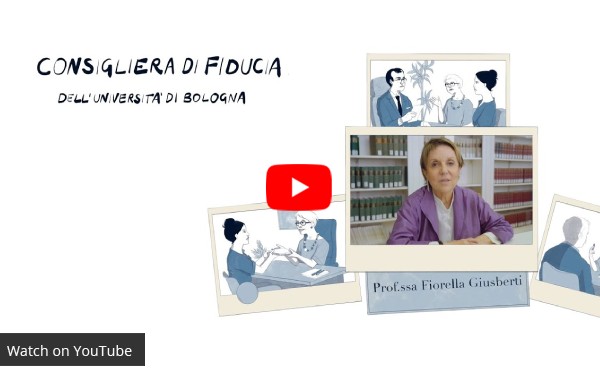Confidential Counsellor
The Confidential Counsellor is tasked with preventing, managing and helping to solve cases of discrimination, sexual harassment, moral or psychological harassment, mobbing and straining in the workplace and in study and research environments, which are brought to her attention.
The role of Confidential Counsellor was first established by Commission Recommendation 92/131/EEC of 27 November 1991 on the protection of the dignity of women and men at work and by European Parliament Resolution A3-0043/94.
EU anti-discrimination directives were transposed in Italy with the approval of the Consolidated Act on Occupational Health and Safety (Legislative Decree 81/2008).
This role is meant as a means of assurance, prevention and intervention in order to uphold and enforce the values listed in the Code of Ethics and Conduct and in the Code of Conduct for the Prevention of Sexual and Moral Harassment [.pdf 241 KB].
Who can contact her
The Confidential Counsellor provides advice and support to teachers, researchers, administrative and technical staff, non-structured research personnel, students, PhD students.
Anyone who believes they have been exposed or are being exposed to acts or behaviour considered offensive to a person’s dignity or that cause psychological or physical distress, may contact the Confidential Counsellor for further information, advice, assistance and, if necessary, to take action.
What she does
The Confidential Counsellor’s work is based on neutrality, impartiality and confidentiality and is aimed at receiving and examining complaints and reports of distress in order to identify and find possible solutions.
The Confidential Counsellor works fully autonomously and she may be assisted by experts, must respect the wishes of the person who contacted her, and does not take any initiative unless agreed with the person who approached her.
The Counsellor acts mainly following informal procedures during which she hears from the alleged victims and suggests the best solutions to address and resolve the situation. She may acquire information, access documents, propose meetings between the people involved and, in some cases, report directly to managers, directors, vice-rectors, and other institutional figures, always respecting the wishes and protecting the person who contacted her. She may also provide assistance in the event of formal reports.
Who is the current Confidential Counsellor and how can I contact her?
The position of Confidential Counsellor is currently held by Professor Fiorella Giusberti.
Professor Giusberti is available by appointment only, to be scheduled by emailing her at consiglieradifiducia@unibo.it
If you wish to be contacted, feel free to give the Confidential Counsellor your phone number.
Offices: via Filippo Re 4, Bologna.
Definitions of discrimination, harassment, mobbing and straining
- Discrimination: any discriminatory behaviour against people because of their sex or gender, ethnicity, race, religion, sexual orientation, personal and political beliefs, disability, age or other factors.
- Sexual harassment: any unwelcome sexual behaviour or conduct of a sexual nature, demeaning attitudes or verbal and physical conduct directed at a person’s sexuality.
- Moral or psychological harassment: any unwanted behaviour that creates a hostile, humiliating, degrading or offensive environment that threatens a person’s psychological and physical integrity.
- Mobbing: a series of actions or behaviours that are systematically and consistently repeated over time, with disparaging and vexatious overtones that may undermine a person’s professionalism and dignity in the workplace or study environment.
- Straining: vexatious conduct characterised by a single, isolated act of harassment that is likely to cause distress for a worker or student and may threaten a person’s physical and mental health.

